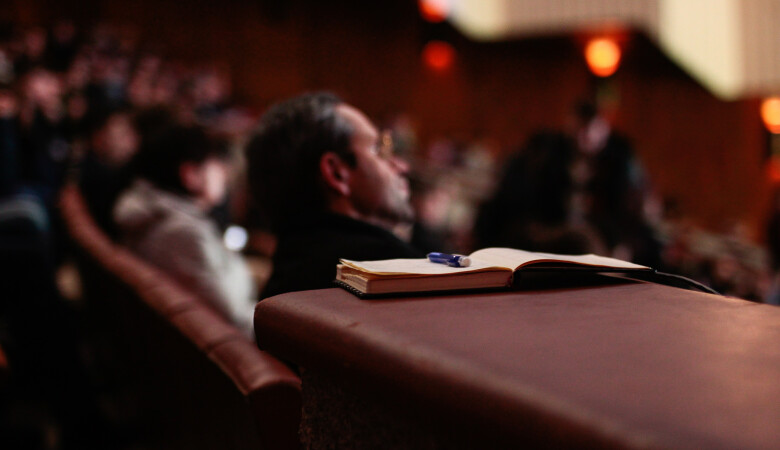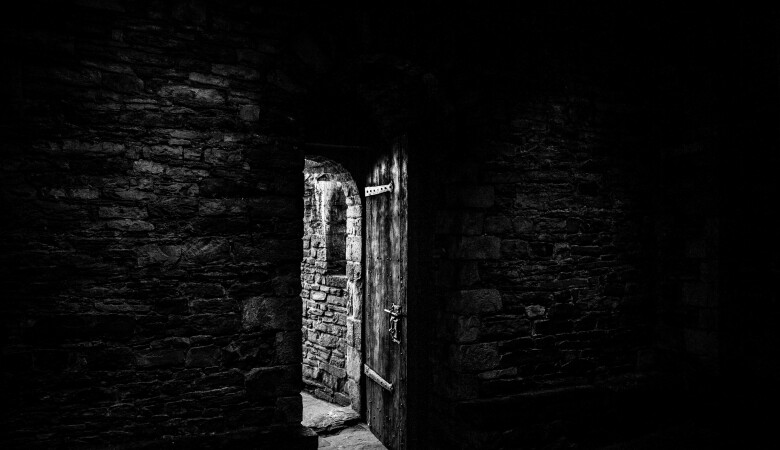Series: Mark
Christ Alone Can Heal The Soul (Mark Sermon 9)
March 06, 2022 | Andy Davis
Mark 2:13-17
The Power of Sin
In this sermon on Mark 2:13-17, Pastor Andy Davis preaches that Christ alone can cure the sin diseases that plagues us all.
-TRANSCRIPT-
A Parable of a Pandemic
Turning your Bibles to the Gospel of Mark, we continue our study here today in the text, Mark 2: 13-17. Since approximately March of 2020, the human race has been experiencing what medical experts call a pandemic. I don't really think I had heard that word before. I had heard the word epidemic many times, and I used it in sentences, but suddenly this word pandemic came on my consciousness. An epidemic occurs when a disease in one geographic locality results in a sudden increase in cases of that disease in that one place. A pandemic occurs when that outbreak spreads widely over a vast geographical region, or even worldwide affecting a sizeable portion of the population. The word itself, “pandemic”, comes from two Greek words, “pan”, meaning all, and “demos”, meaning people, literally all the people. I have no problem with the use of the word, but in actuality, when it comes to physical diseases, actual maladies, there has technically never been a pandemic in all of human history. There is no single disease which literally infects or affects all the people of the entire world. Or is there?
In our text today, Jesus clearly likens sin to a disease and his own ministry, to the healing work of a physician. Jesus visited the house of Levi, a tax collector, and a huge number of tax collectors and sinners came that night to Levi's house, and Jesus ate with them. The scribes, who were Pharisees, were outraged. They prided themselves in avoiding all contact with such defiled, wicked people. Much of their religion was based on them avoiding the sins of such people. They didn't do this, and they didn't do that, and they stayed far away from people who did such wicked things. They spiritually quarantined themselves from sinners, less they should somehow catch the contagion of their sins. So when Jesus violated this principle and dove right into the midst of a crowd of tax collectors and sinners, when he ate food with them and drank drink with them, and when he reclined at table with them, and conversed pleasantly with them, these religiously quarantined Pharisees were scandalized, shocked, stunned, enraged. To them it was clear proof, Jesus is not from God, for God is pure and holy, far above all evil. He's close to the pure and upright, people like them.
Jesus addressed their accusation with a clear analogy in verse 17, "It is not the healthy who need a doctor, but the sick. I've not come to call the righteous, but sinners." So sin is a sickness, and Jesus is the physician.
Let's go back to the way I began my sermon with a meditation on the word “pandemic.” I said, there's never been, historically, a true pandemic in the literal sense of the etymology, a physical disease and actual malady that has swept through the entire population of the world. Perhaps the most famous is the Black Death, the bubonic plague, which ravaged three continents from the year 1346 to 1353. We read of whole towns being wiped off the face of the map by death. Estimates range from 75 to 200 million dead, record keeping just wasn't what it is today, scientific as it is today. The estimated 50 million dead of Europe would've represented maybe as high as 60% of the population of that continent. That dwarfs any other medical tragedy in all of human history, but it's still not 100%. There really is only one pandemic, and that is sin. The Bible tells us that all people, the entire human race sinned in Adam. Romans 5:12, “Therefore just as sin entered the world through one man, and death through sin.” And in this way, death came to all men, because all sinned. So we sinned positionally in Adam, the entire human race. All human beings are conceived in sin, born in sin, steeped in sin from infancy. Confirm their sin as soon as they understand right from wrong in the existence of a holy and good God, who demands that they love him and serve him with every fiber of their being, every moment of their lives, and that they love and serve their neighbors as themselves. As soon as every solitary human being understands right from wrong, they begin their evil career. Their career in sin, all of us do. Listen to this universal description of sin in Romans 3:10-12, “There is no one righteous, not even one. There is no one who understands, no one who seeks God, all have turned away. They have together become worthless. There is no one who does good, not even one.”
Now dear friends, that is the language of a true pandemic. All the people, every single human being on the face of the earth is infected with this terrible disease of sin. Puritan pastor Ralph Venning, who pastored in London during a later terrible outbreak of the Black Death in 1665, 4 years after that, wrote a treatise on sin called “The Plague of Plagues”. He made it plain that sin is worse than any physical disease could ever be: "Sin is the dare of God's justice, the rape of his mercy, the jeer of his patience, the slight of his power, the contempt of his love. It is the upbringing of his providence, the scoff of his promise, the reproach of his wisdom. Sin seeks to sit in God's place ruling over all God's works. What God has made beautiful, sin universally makes ugly." It is a true pandemic, because there's not a single location on earth where human beings reside that is free from this plague. All over the earth, human beings are born in inequity. They grow up in fanatical and prideful commitment to self-interest. They would seek to rule over their own lives as they see fit, contrary to the word of God. They spread their contagious pride and lust and covetous greed, and murderous anger, and filthy language wherever they go. This is the plague of plagues, and it is the only true pandemic. It is far deadlier than any physical malady has ever been, because it threatens humanity, not only with physical death on earth, but with eternal death in hell. One of the great problems of this pandemic is that it affects the perceptions of the ones that have the disease, so they don't think that they're sick.
I want to tell you a little parable. Imagine living in a populous and influential town in Europe, in the 14th century, during the height of the Black Death. Imagine that you yourself have the telltale signs of the infection: painfully swollen lymph nodes, you have chills, headache fever. A few hours later, it develops into tissue bleeding and intense abdominal pain. You stagger out into the street and you see every member of your family looking just like you. So, also, all your neighbors. And as you stumble down the street, you see every tradesman and merchant slumped by his shop with the same telltale signs all over their bodies. But suddenly you hear a call summoning all the citizens of the town to assemble. You recognize the voice. You make your way to the town center. And there you see the prince, the son of the king, and he's standing straight and tall, strong, and he's holding a loft in his hand a flask. It's got a liquid in it and he cries aloud, "Hear ye, hear ye, all ye members of this noble town, you are all stricken with a dread disease, and will shortly die if you're not immediately healed. Now, I have come with your cure. If you'll allow me to pour this elixir down your throat, you'll be cured immediately. But this cure is only offered to those who know they are sick." Hope rises in your heart. You look around to your friends and your family member, and you say, "Let's go and be healed." But one by one, they turn their faces away, and they all say, "I'm not sick. I'm fine." You're stunned. But you're determined. You have no other choice. You can't imagine that the prince, a kind and wise man, would be lying to the people. You join in a small group of obviously sick people waiting your turn. One by one, those ahead of you open their mouths and the prince pours of medicine down their throats. And immediately they're visibly improved, strengthened, revived. They jump to their feet. Soon their skin becomes ruddy and obviously healthy again. Now at lasts it's your turn. And you open your mouth and the medicine flows in. You feel a surge of energy within you. And you know, you have been truly healed. You can feel it in your body. The prince then walks through the town, holding the same flask of loft. A small entourage of newly healed people follows in his train. He cries out, "Here's the cure. You need only to come and drink, and you'll be healed." But most of the people in the town turn away saying, "I'm not sick." You speak to your friends, neighbors, even beloved family members, but the disease seems to have affected their minds. They're delusional. They say, "I know. I feel a little weak and I have a few sores on my skin, but everyone has that. I mean, look around. Besides, look, I can stand up. I can walk. I'm not coughing much. I can pick up a pitcher water and lift it high. I'm fine. I don't need that."
Friends, I wonder if this is what the world looks like to the angels who look down on our sin, sick human race, as the gospel makes its way around the world. I especially wonder at some people who think they're good enough people not to need a savior like Jesus. This sermon flows from a text that addresses that very issue. Last time we saw Jesus' amazing authority to forgive sins.
You remember four friends lowered the paralyzed man down through a hole in the roof that they'd made with their own hands. They unroofed the roof, and they lowered the paralyzed man down. It says in Mark 2:5, “When Jesus saw their faith, he said to the paralytic, “Son your sins are forgiven." And when Jesus' enemies heard him say that they thought in their hearts, “Who is this man, he's blaspheming, who can forgive sins, but God alone?”. Jesus knew their thoughts, and said to them, "Which is easier to say to the paralytic, 'Your sins are forgiven,' or to say to the paralytic, 'Get up, take your mat, and go home.’But I want you to know that the son of man has authority on earth to forgive sins, and he said to the paralytic, ‘Get up, take your mat, and go home.’ He got up in full view of them all picked as mat and walked out.” Jesus proved his greatest power, the power to forgive sins. In the language of the pandemic I've been describing, Jesus has the cure to the deadliest disease that's ever faced the human race, the disease of sin. He has absolute power of God to forgive of all of our sins for all time.
The Great Physician Calls a Sick Sinner
Now in this text, we're going to see the only people he will forgive. In the language of the pandemic, the only people this great physician will heal are those who know that they are sick with sin.
My first point: the great physician calls a sick sinner. Look at verse was 13 and 14, “Once again, Jesus went out beside the lake. A large crowd came to him and he began to teach them. As he walked along, he saw Levi, son of Alphaeus, sitting at the tax collector's booth. ‘Follow me,’ Jesus told him. And Levi got up and followed him.” The location of this particular story is out by the seashore, the Sea of Galilee. The huge crowds that followed him were so overwhelming. As we saw last time, this is why they unroofed the roof. So overwhelming that no building is big enough to hold them all. Jesus is outdoors a lot walking beside the Sea of Galilee, a huge crowd follows. Again, as always, his top priority is teaching, preaching the word. It's the most important thing he does. The primacy of the word. All of Jesus' miracles address temporary issues in the people's lives, temporary problems that they're facing, sickness, pain, hunger, but the ministry of the word addresses the root issue, the state of their souls before all mighty God. Preaching of the word alone addresses the real problem, the root of the issue.
As He's walking along, He meets a man named Levi, the tax collector. Jesus is constantly moving from place to place, constantly walking. This gives me a picture of a spiritual pilgrimage that we're on. We're moving from here on to another place. Jesus said, "You know the way to the place where I'm going." They said, "We don't know where you're going. How can we know the way?" Jesus said, "I am the way and the truth and the life. No one comes to the Father except through me." There's a sense of Jesus walking along, and He's calling on us to get up and follow him. We're going somewhere, we’re going to heaven.
On the beach of Normandy, D-Day, June 6th, 1944, that coastline along the north of France, the troops landed in sections of beach that were completely prepared to repel the invasion. Every square inch of the beach had been pre-sighted, was under the constant assault of precision artillery, and machine gun fire. There was not a single safe place on that beach. If they stayed there by the water's edge, they would most certainly die. So it is when it comes to following Jesus, you can't stay where you are. You almost certainly die. So He's walking along, he says, "Follow me." And that's what happened with Levi, son of Alphaeus. He's walking along, He sees Levi sitting at the tax collectors booth, and He calls him, as a master calls a disciple, as a king commands a subject, "Follow me." Instantly Levi gets up and follows him. Now imagine what the crowd must have thought. Tax collectors are among the most despised people in the world. The Roman conquest inevitably led to taxes. It was their spoil, the ongoing plunder and spoil from them conquering that part of the world. The tax money flowed into the Roman coffers and made the Roman emperor's rich, “and enabled them to transform the city of brick into a city of marble," Caesar Augustus boasted. The actual collecting of the taxes was handled locally. Herod Antipas was responsible to Rome for a certain load of taxes every year. Herod then recruited collectors, by selling tax collecting franchises to Jews who were willing to buy them. This was a lucrative business. The tax collectors were protected by the power of Rome, to touch them was to incur a Roman death sentence on your head, so they were inviolate, you couldn't touch them. The tax collectors were required to collect a certain tax quota and anything beyond that amount was theirs to keep. Obviously the system was rife with corruption, and they could get very wealthy, but the social cost was very high. They were seen to be traitors. All over the world, tax collectors are seen to be traitors to their neighbors and their countrymen, but especially among the Jews, because there's a theological side to it. That was the promised land they were living in. The land had been promised to Abraham and to his seed forever. The Romans therefore were seen to be interlopers. Therefore, later in Mark's gospel, some are going to come to Jesus in Mark 12, with this question, "Is it right to pay taxes to Caesar or not? Should we pay or shouldn't we?" This is a question. So how much worse were Jewish tax collectors, collaborating with this oppressive Roman regime? They're all almost despised as much as lepers, maybe in some ways worse than lepers who were declared officially, spiritually unclean. They couldn't come to the temple. If you went to their house, you were unclean. And to make matters worse, tax collectors, being barred from the religious life of the Jews, mostly gave up on being pious at all. They used to live openly, profligate, wicked lives. They lived “high on the hog,” so to speak. They ate whatever they wanted, they drank, there was sexual immorality. I mean, that was just how they lived. That was the life of a tax collector. Every night they would get together and feast, and Levi, son of Alphaeus, was a tax collector.
What did this call from Jesus mean? Well, He's calling Levi, who we know is Matthew, that's his Greek name, to follow him as a disciple. So imagine the stunned reaction of the crowd. Everyone undoubtedly knew Levi, and they hated him. More importantly though, Jesus knew Levi, because He knows all people. He knows what's inside someone's heart. He knows that Levi is ready to follow him, ready to be set free from sin. And Levi, undoubtedly, knew who Jesus was. Jesus was known by everyone. He, undoubtedly, would've heard of all of these healings and these amazing teachings. Jesus was calling on Levi to get up and burn that bridge. He was not going to be able to go back to the tax collecting office. Somebody else would come and take his place. To follow Jesus meant that the world had become dead to him, and he to the world. Now Levi certainly didn't understand all that at that point, but he would. He would learn that “foxes have holes, and birds of the air have nests, and the son of man has no place to lay his head.” He's burning that bridge. But Levi lost the world and gained his soul. Sins are forgiven. That night he celebrated with all of his friends who happened to be tax collectors and sinners. That's who he knew, and he called them to a big banquet at his house.
The Great Physician Heals Many Sick Sinners
Second point: the great physician heals many sick sinners. Look at verse 15, “While Jesus was having dinner at Levi's house, many tax collectors and sinners were eating with him and his disciples, for there were many who followed him.” It's well known that the first days of a new convert, that individual has the greatest evangelistic opportunities they'll ever have in their Christian life, because all their friends and probably their whole family are all unbelievers. They have opportunities to have some influence to talk about their new life in Christ. And so, as I said, Matthew's friends are in the tax collection business, and the party that night was at at Levi's house. That's where we're going. In the course of time, the Holy Spirit would choose Levi, (Matthew), to write one of the four accounts of Jesus' life. Levi(Matthew)’s list of converts over 20 centuries will be vast and unmeasurable. But his journey of evangelistic fruitfulness began that night at his house, with all of his sinful friends. Tax collectors and sinners, most of your English translations have the word “sinners” in quotations, the way these people were understood back then, that’s who was there.
Self-righteous people tend to divide the world into two categories, good people and bad people. You got the sinners and the righteous. The good people are moral, law abiding, fine upstanding citizens. They attend religious services. They're probably good looking. They're successful. They're winners. They're not a drain on society. Then you've got the bad people, the sinners. The sinners are people who lived immoral lives. They, in this case, had cast restraint to the wind. They were drunk, thieves, thugs, prostitutes, scoundrels, highway robbers, and fun-loving folk whose slogan would probably be something like “Eat, drink and be merry for tomorrow we die.” Those are the sinners. Now, interestingly, both the self-righteous and the sinners, so-called, accepted this basic division. Religion was for the good people. Both the Pharisees and the sinners thought there could be no salvation for the sinners. But that night, revival broke out at Matthew's house, a vast number of tax collectors and sinners are brought to faith in Christ.
Missionary C.T, Studd, a missionary to China, said that, "Some people want to live within the sound of chapel bell, but I want to run a mission, a yard from the gate of hell." No one did that better than Jesus. That's why He plunges in and immerses himself in this feast with the tax collectors and sinners. That's where the people He wanted to save were. A ray of sunlight is not defiled by a pile of stinking garbage, it remains pure. When Jesus touched the leper, He didn't get leprosy. He poured healing into that man. When He went to that feast, He wasn't defiled by it, He transformed it. I imagine He told some of his parables, his stories. He seized the moment with his teaching, and captivated their hearts. His words were unlike any that anyone had ever seen. And perhaps some of them wept because they realized for the first time they actually could be forgiven. There was an actual possibility of forgiveness for them. They could actually have a relationship with God, because here's the son of God telling them so. Instead of seeing judgment and rage and wrath, they saw compassion and love and forgiveness flowing from him like sunlight, like beautiful, pure water from a crystal mountain spring. That's what they saw in Jesus. They didn't defile him, He saved them. He cleansed them by the preaching of the word. And they followed him too. Look at verse 15, “And there were many who followed him.” They got up, spiritually, from their sinful lives and began following him on a highway of holiness. The great physician was healing their souls, and speaking to them the words they never thought they could ever hear, "Your sins are forgiven. Your sins are forgiven. Your sins are forgiven."
The Great Physician Accused by the Self-Righteous
Point three: the great physician was accused by the self-righteous. Verse 16, “When the teachers of the law who were Pharisees saw him eating with the sinners and tax collectors, they asked his disciples, why does he eat with tax collectors and sinners?” So now here are these people again, aren't you sick of them? I mean, it's like every account, they just show up. They're dogging Jesus' steps, these Scribes and Pharisees, the self-righteous religionists of the day. They believed they were righteous, they believed they were healthy, they believed they were secure. They'd never murdered anyone physically, so they were holy. They'd never committed adultery physically, so they were holy. They followed all the temple rules and the regulation. They made all the religious sacrifices. They attended all the convocations prescribed by the laws of Moses. They were the chosen race, the sons of Abraham, and they were special among them, because they poured over the laws daily. They had, so they believed, never broken a single command of God from their youth. Do you know how many people said that to Jesus? Numbers of them said, "From my youth, I've kept a whole law."
Furthermore, they isolated themselves from people like this. Like I said, they're in a spiritual quarantine. They didn't get involved. They almost certainly didn't go into Matthew's house. No way. They were, so they thought, the healthy spiritually, so they believed. They had no need of a physician from an illness they absolutely did not think they had, so they grumbled against Jesus. In their mind, by Jesus eating and drinking with tax collectors and sinners, He was every bit as defiled as they were. Now, just stop for a minute and be amazed at them, at this whole thing. Self-righteous people, who not only hate the sinners who are not leading as moral lives as they are, but they hate the only, truly, morally, perfectly pure man that's ever lived. They hate him too, because he testifies about them that their works are evil. They hated him. because he exposed their hypocrisy. He actually, to some degree, said they had the pandemic worse than anyone else. They would settle into a powerful, durable opposition to Jesus, leading ultimately to his death.
The Great Physician Declares Who He Will Heal
Point four, the great physician declares who He will heal. Look at verse 17, “On hearing this Jesus said to them, ‘It is not healthy who need a doctor, but the sick. I have not come to call the righteous, but sinners.’” This is a vital teaching. I believe Jesus, by this one statement, gives us permission to see all of his physical healings, literal physical healings, as pictures of this spiritual healing we all need. You can look at him healing a man born blind and see a spiritual healing from our spiritual blindness. We have the permission to just go from the healings to the spiritual realm, from this one statement. Healing sinners of sin by calling them to repent to their sins and believe the gospel is the true healing He came to do. It's the only one that really mattered, because sin is the ultimate plague of plagues. And Jesus is the only physician with the cure to the true ailment of the human condition, the sickness of sin.
Now this therapeutic, this healing view of salvation is essential to how I understand much of the Christian life in my ministry. It's one of the ways that I've tended to resolve gnarly issues of divine sovereignty and human will, Calvinism, other things like that. You hear sometimes of the doctrine of irresistible grace, others call sovereign grace or effectual calling. I think if you look at it therapeutically, it all becomes clear. I believe that all conversions are in some sense, a work of healing, of therapy. Let's look at the healing of the man born blind. The eye was crafted by God to see light. It's what it was made to do, to give a true view of the world in its radiant colors to the mind. When someone is blind, it is a clear violation of God's original purpose for that exquisite organ, the eye. When Jesus healed the man born blind, when he healed his eyes, then his sight was restored and he saw as God intended, light flooded in. Jesus told him, "When your eyes are good, your whole body will be full of light." Light, it just worked, it flooded in, and he saw beauty in color.
In the same way, our souls, our hearts were meant to appraise things, comprehend them, evaluate them, and then be attracted to the good and repulsed from the evil, like God. That's what we're made for. We were ultimately meant to be attracted to God, himself, to love him above everything else, to be attracted to God. He is the purest light, He’s the most beautiful being in the universe. It is a sick, diseased heart and soul that hates God. So when God takes the heart of stone out and gives you the heart of flesh, that's a work of therapy. That's a healing that He does. He's healing the sick, sin twisted heart to love what is the most perfectly love worthy being in the universe, God, himself. It's like water flowing downhill, it's just going to happen. When the healing happens, the person follows Jesus, the person loves Christ. The heart's going to be drawn in love to Christ, and see his beauty and delight in it and follow him.
And it's also going to flow out horizontally. We're going to start loving our neighbor as ourselves. We're going to see them in the image of God, and we're going to start loving them. It's just the healing that happens. So salvation's a healing of this sin sick human heart. Now Jesus says here, He did not come to heal the self-righteous. “Healthy people," He says, "have no need of a physician." They don't come to a doctor. Now imagine a person managing to pull some strings and get a consultation with a busy specialist. Maybe let's say the greatest heart doctor in the world. So this heart doctor is a world renowned, extremely difficult specialist. You can't get to this man, but turns out that this person has an influential friend, who can pull the strings and get him a session with the cardiologist. The cardiologist has flown in from some distant city and comes to the clinic in that person's city. They sit down and the cardiologist says, "Okay, tell me what's going on? What are your symptoms? How long have you been experiencing pain in your chest?" The man says, "Oh, I actually don't have any pain in my chest. I don't have any symptoms at all." "What?" "Oh no, I'm in fine condition. I think actually my cardio is the best part of my body." "Well, what do you want me for? What am I here for then? That makes no sense at all. Why did I fly here to talk to you? If you're not sick, you don't need me." Jesus said that, "It is not the healthy who need a doctor."
Then look at the second devastating statement He makes here, "I have not come to call the righteous." Jesus came from heaven to earth. He came into the world for a purpose. He came from heaven to earth to do his Father's will. He entered the world of suffering and sin and death, but He did not come because the world was fine as it was before He got here. He did not come for the righteous. He didn't come from heaven to earth to tell you how wonderfully righteous you are. That's not why Jesus came, not at all. He did not come for people who don't think they need a savior. Essential to everyone's salvation by Jesus Christ is this, that they admit that their heart is sin sick and twisted. As Jeremiah 17:9 says, “The heart is deceitful above all things and beyond cure, who can understand it.” Christ cannot do anything for these self-righteous scribes and Pharisees who consider themselves healthy, spiritually, pure and free from sin. He didn't come for them. Who did He come to heal? Look at verse 17, “’It’s not the healthy who need a doctor, but the sick. I have not come to call the righteous, but sinners.”
The Great Physician Calls Each of Us
So what you need to do right now, you need to ask the Lord to show you the depth of your own sinfulness, and the way He does that, that diagnostic of the soul is the law of God. By the law of God, He probes us all. The Ten Commandments are designed to reveal the corruption of the human heart. The 10th commandment, you shall not covet, shows that the desires of the heart matter.
Then Jesus feeds those back into the issues of anger and lust and shows He's not just looking at the outside behavior. He's looking at the attitude and demeanor of the heart. We have all broken the Ten Commandments, and we violated the two Great Commandments. We don't live every moment of our lives in loving service to God or in service to others. We are sin sick. Ask the Lord to show it to you. Cry out against yourself. Declare to Jesus that you are prideful and lustful and covetous and selfish. Acknowledge patterns of anger that would be murderous, if they weren't restrained by human laws. Admit every natural bent of your life is to feed your stomach and your pleasures, and have people honor you and elevate you and have your body pleasured and your ego stroked. Admit that you do not love God with every fiber of your being. And admit with Paul, the depth of the sin problem. Romans 7:15, “I do not understand what I do. For what I want to do, I do not do, but what I hate I do.”
We're called to repentance. In Luke, there's an extra little phrase added, Luke 5:31, 32. Jesus answered them, "It is not the healthy who need a doctor, but the sick. I've not come to call the righteous, but sinners to repentance." To repentance. Sin is willful rebellion against almighty God. Jesus is calling on sinners to repent, to hate the sin, to grieve over the sin, and turn away from it. Jesus is saying He will pay the penalty for our past, present, and future sinfulness by the shedding of his own blood on the cross. To repent then is to cry out against ourselves. To know we don't deserve to lift our eyes to heaven, to beat our breasts and cry out against ourselves, and say, "What a wretched person I am, who will save me from this sin. Be merciful to me, oh God, the sinner." It is to resolve to hate our sins and grieve over our sins, and forsake our sins and fight against our sin for the rest of our lives by the power of the Spirit. This is the person that Jesus heals, and He does heal completely.
With the joy of Levi and his tax collecting friends, we can leap for joy, we can know that the holy judge of all the earth has looked upon us and declared all of our sins forgiven. The Great Physician has looked upon our corrupt sin sick souls, and is determined to heal them. And when He is done saving us, we will be 100% healthy for all eternity, conformed to his heart. The Great Physician is now calling each one of us. Admit that your heart is desperately sick. Get rid of the normative view in the world, “I am basically a good person,” get rid of that. Scripture reveals that you are not basically a good person. See yourself in the text. Say, "I am one of the sinners at that feast." Trust in Christ to heal your soul of sin. Then understand, unlike the physical healings Jesus did, remember the seven elements of the healing. Let me zero in, the healing of our souls is not instantaneous. The forgiveness of our sins is instantaneous, but God wills a long, progressive healing of our souls from sin. Do you remember that healing in Mark 8, He heals a man in stages, remember the blind man? He spits on his eyes and touches him. He says, "What do you see?" He said, "Well, I see people. They look like trees walking around." Then Jesus touched him again, and the scripture says he saw everything clearly. Was Jesus just having a bad day? I mean, what happens? He intentionally healed him in stages. Do you see everything clearly? Or do you see through a glass darkly? Do you not need an ongoing healing in your soul from sin? I do. Isn't that why you're here today? Jesus has the power to heal your souls completely. It’s progressive. It’s instantaneous forgiveness, progressive healing of the heart, and then instantaneous perfection at the end. I'm looking forward to that final stage. Aren't you? When Jesus finishes his healing in you and me, and we'll be done forever with sin.































